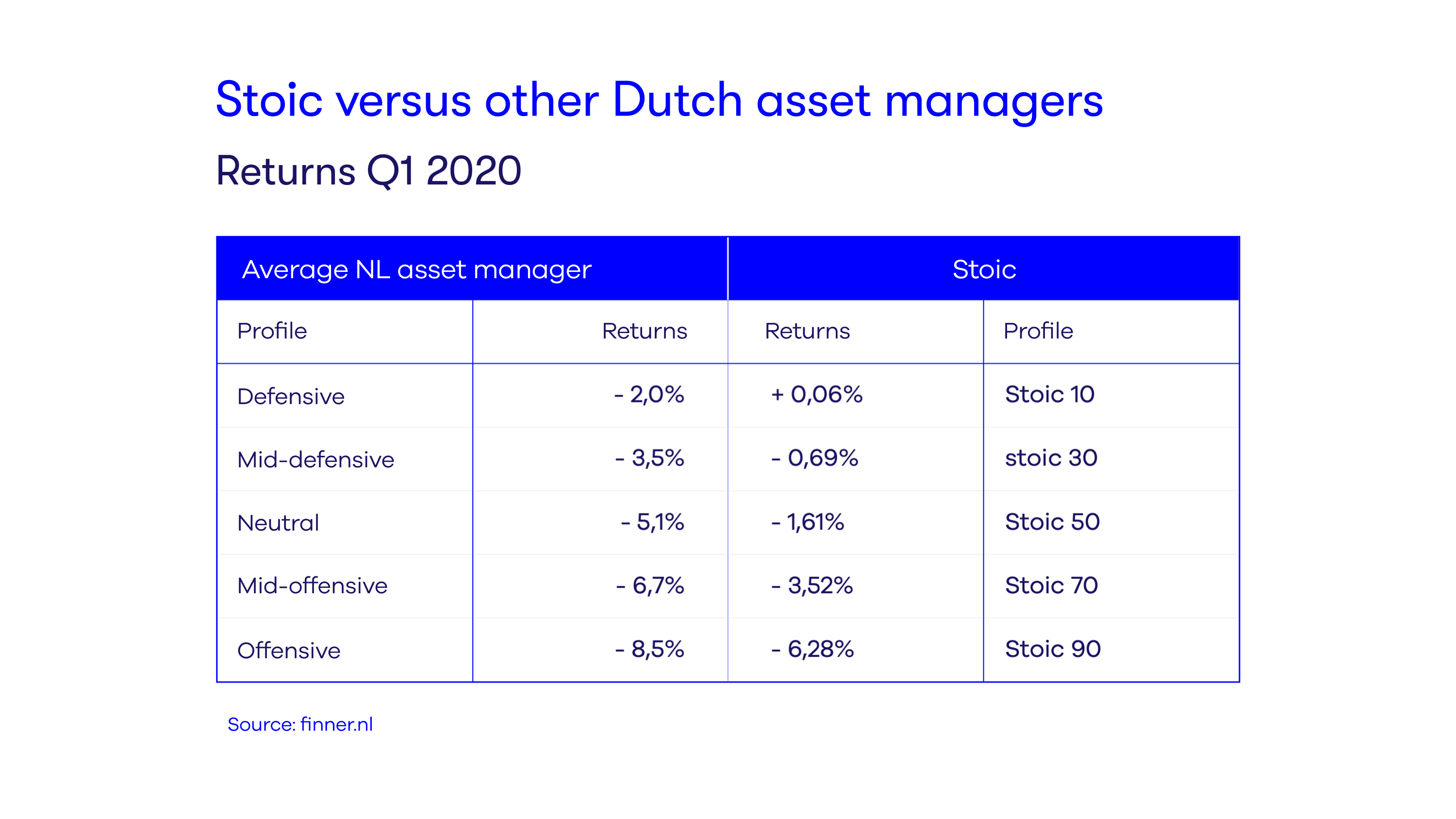In early 2020, the coronavirus crisis erupted in the financial markets. Active asset managers often claim to be of added value precisely during such a crisis. After all, by actively trading the right stocks, they can minimize the losses from such a price drop, or even turn them into profits. "Passive" managers (like Stoic), on the other hand, slavishly follow the global economy and therefore plummet along with the falling markets. It all sounds perfectly logical. However, this assumption is completely flawed. In this article, we explain exactly how this works.
Let's take a look at the recent publication by asset management comparison site Finner.nl about the performance of Dutch asset managers in the first half of 2020. How is Calm Capital Control by Stoic performing during this crisis compared to the rest of the Dutch asset management sector? Who is best able to contain the damage? The facts speak for themselves; just take a look at the figures below:

According to figures from Finner.nl, Stoic significantly outperforms the average Dutch asset manager in every profile. Our "neutral" Stoic 50 profile even outperforms the average of asset managers in the Netherlands by well over 3%!
These figures support our vision: simply follow the global economy, because that's simply the best way to boost your returns. Financial markets are impossible to predict. For example, no one saw the coronavirus crisis coming. That's why it's wiser to invest in the entire global economy. If one stock falls sharply, that effect is mitigated by another potentially rising. An active investment strategy, where one favors certain stocks (or bonds), or a specific entry or exit point, is completely pointless: these are always actions based on an "expectation," which is the same as "predicting." And no one has a crystal ball that truly works.
In short: a crisis is a (very) unpleasant period that simply has to be "sat through." Because in the long run, the global economy always grows. That's why at Stoic, we diversify your assets across the entire global economy. We don't do much else. And that's proving to be the best strategy, even in times of crisis.
The observant reader will now notice that the performance figures published by Finner.nl are an average. So there must be (active) managers who have significantly outperformed the rest, perhaps even Stoic?
That's right: those managers do exist. But try finding them! It's impossible to predict in advance which asset manager will outperform the rest. Sometimes asset manager A is right. Other times, asset manager B is lucky enough to be right. But no asset manager consistently outperforms the market, simply because the market is unpredictable. It sounds boring, but it's much wiser not to let the fate of your assets depend on luck, and therefore also on bad luck. That's why at Stoic, we invest your assets across the entire global economy. This means we keep our emotions in check and accept losses in times of crisis—albeit relatively moderate losses, thanks to our ultimate diversification across the global economy. We then trust that, in the long run, the global economy always grows.
Perhaps you're a very critical reader. You'll probably realize that the average return of Dutch asset managers includes both active and passive asset managers. So, the fact that we at Stoic outperform the average Dutch asset manager is nice, but that doesn't mean our form of extremely passive investing is consistently better. After all, the average figure also includes other passive managers.
That's right. In fact, if you scroll down a bit in the Finner article, you'll see a comparison between the results of active and passive managers. Oddly enough, the differences are less pronounced than you might expect based on our own rave about our extreme form of passive investing. In fact, on the defensive profile, active managers even outperform passive asset managers! How does this square with our belief that extremely passive investing always works best?
Well, that mainly has to do with the definition of what "passive asset management" actually is. Most asset managers categorized as "passive" by Finner.nl aren't, in our strict opinion, always truly passive. For example, there are asset managers who invest your assets in a carefully selected 500 stocks, and then do nothing more: no entry or exit from the stocks in question. And no putting more money into one stock at the expense of another. It does mean: simply waiting to see how the portfolio of 500 stocks performs over time. That's utterly "passive," isn't it?
That's certainly passive, because there's no trading involved. But that's not what we at Stoic truly consider "passive." Because, in our view, the mere fact of selecting 500 specific stocks is already a "predictive" choice, and therefore an "active" investment strategy: after all, why would someone specifically choose these 500 stocks and not others? At Stoic, we don't believe in such predictions. We invest your assets solely in an exact replica of the entire global economy. That's truly passive investing. Or perhaps we should call it "Prediction-Free Investing." Either way, the recent return figures prove once again that it works.


